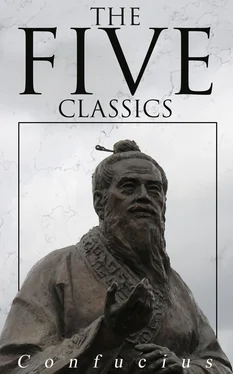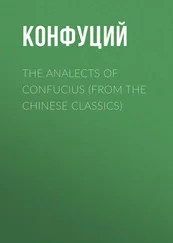Confucius
Premium Collection – The Books of the Traditional Confucian Canon
Translator: James Legge
e-artnow, 2021
Contact: info@e-artnow.org
EAN: 4066338130174
I Ching
Shu King
The Shih King
The Li Ki
Spring and Autumn Annals
Table of Contents
Preface
Introduction
Chapter I. The Yî King From the Twelfth Century B.C. To the Commencement of the Christian Era
Chapter II. The Subject-Matter of the Text. The Lineal Figures and the Explanation of Them
Chapter III. The Appendixes
Plates I, II, III, Exhibiting the Hexagrams and Trigrams
The Text
Section I
Hexagram I. Khien
Hexagram II. Khwăn
Hexagram III. Kun
Hexagram IV. Măng
Hexagram V. Hsü
Hexagram VI. Sung
Hexagram VII. Sze
Hexagram VIII. Pî
Hexagram IX. Hsiâo Khû
Hexagram X. Lî
Hexagram XI. Thâi
Hexagram XII. Phî
Hexagram XIII. Thung Zăn
Hexagram XIV. Tâ Yû
Hexagram XV. Khien
Hexagram XVI. Yü
Hexagram XVII. Sui
Hexagram XVIII. Kû
Hexagram XIX. Lin
Hexagram XX. Kwân
Hexagram XXI. Shih Ho
Hexagram XXII. Pî
Hexagram XXIII. Po
Hexagram XXIV. Fû
Hexagram XXV. Wû Wang
Hexagram XXVI. Tâ Khû
Hexagram XXVII. Î
Hexagram XXVIII. Tâ Kwo
Hexagram XXIX. Khan
Hexagram XXX. Lî
Section II
Hexagram XXXI. Hsien
Hexagram XXXII. Hăng
Hexagram XXXIII. Thun
Hexagram XXXIV. Tâ Kwang
Hexagram XXXV. Ȝin
Hexagram XXXVI. Ming Î
Hexagram XXXVII. Kiâ Zăn
Hexagram XXXVIII. Khwei
Hexagram XXXIX. Kien
Hexagram XL. Kieh
Hexagram XLI. Sun
Hexagram XLII. Yî
Hexagram XLIII. Kwâi
Hexagram XLIV. Kâu
Hexagram XLV. Ȝhui
Hexagram XLVI. Shăng
Hexagram XLVII. Khwăn
Hexagram XLVIII. Ȝing Hexagram
Hexagram XLIX. Ko
Hexagram L. Ting
Hexagram LI. Kăn
Hexagram LII. Kăn
Hexagram LIII. Kien
Hexagram LIV. Kwei Mei
Hexagram LV. Făng
Hexagram LVI. Lü
Hexagram LVII. Sun
Hexagram LVIII. Tui
Hexagram LIX. Hwân
Hexagram LX. Kieh
Hexagram LXI. Kung Fû
Hexagram LXII. Hsiâo Kwo
Hexagram LXIII. Kî Ȝî
Hexagram LXIV. Wei Ȝî
The Appendixes
Appendix I Treatise on the Thwan, or King Wăn's Explanations of the Entire Hexagrams
Appendix II Treatise on the Symbolism of the Hexagrams, and of the Duke of Kâu's Explanations of the Several Lines
Appendix III The Great Appendix
Appendix IV Supplementary to the Thwan and Yâo on the First and Second Hexagrams, and Showing How They May Be Interpreted of Man's Nature and Doings
Appendix V Treatise of Remarks on the Trigrams
Appendix VI The Orderly Sequence of the Hexagrams
Appendix VII Treatise on the Hexagrams Taken Promiscuously, According to the Opposition or Diversity of Their Meaning
Table of Contents
I wrote out a translation of the Yî King, embracing both the Text and the Appendixes, in 1854 and 1855; and have to acknowledge that when the manuscript was completed, I knew very little about the scope and method of the book. I laid the volumes containing the result of my labour aside, and hoped, believed indeed, that the light would by and by dawn, and that I should one day get hold of a clue that would guide me to a knowledge of the mysterious classic.
Before that day came, the translation was soaked, in 1870, for more than a month in water of the Red Sea. By dint of careful manipulation it was recovered so as to be still legible; but it was not till 1874 that I began to be able to give to the book the prolonged attention necessary to make it reveal its secrets. Then for the first time I got hold, as I believe, of the clue, and found that my toil of twenty years before was of no service at all.
What had tended more than anything else to hide the nature of the book from my earlier studies was the way in which, with the Text, ordinarily and, as I think, correctly ascribed to king Wăn and his son Tan, there are interspersed, under each hexagram, the portions of the Appendixes I, II, and IV relating to it. The student at first thinks this an advantage. He believes that all the Appendixes were written by Confucius, and combine with the text to form one harmonious work; and he is glad to have the sentiments of 'the three sages' brought together. But I now perceived that the composition of the Text and of the Appendixes, allowing the Confucian authorship of the latter, was separated by about 700 years, and that their subject-matter was often incongruous. My first step towards a right understanding of the Yî was to study the Text by itself and as complete in itself. It was easy to do this because the imperial edition of 1715, with all its critical apparatus, keeps the Text and the Appendixes separate.
The wisdom of the course thus adopted became more apparent by the formation of eight different concordances, one for the Text, and one for each of the Appendixes. They showed that many characters in the Appendixes, and those especially which most readily occur to sinologists as characteristic of the Yî, are not to be found in the Text at all. A fuller acquaintance, moreover, with the tone and style of the Appendixes satisfied me that while we had sufficient evidence that the greater part of them was not from Confucius, we had no evidence that any part was his, unless it might be the paragraphs introduced by the compiler or compilers as sayings of 'the Master.'
Studying the Text in the manner thus described, I soon arrived at the view of the meaning and object of the Yî, which I have described in the second chapter of the Introduction; and I was delighted to find that there was a substantial agreement between my interpretations of the hexagrams and their several lines and those given by the most noted commentators from the Han dynasty down to the present. They have not formulated the scheme so concisely as I have done, and they were fettered by their belief in the Confucian authorship of the Appendixes; but they held the same general opinion, and were similarly controlled by it in construing the Text. Any sinologist who will examine the Yü K ih Z ăh K iang Yî King K ieh Î, prepared by one of the departments of the Han Lin college, and published in 1682, and which I have called the 'Daily Lessons,' or 'Lectures,' will see the agreement between my views and those underlying its paraphrase.
After the clue to the meaning of the Yî was discovered, there remained the difficulty of translating. The peculiarity of its style makes it the most difficult of all the Confucian classics to present in an intelligible version. I suppose that there are sinologists who will continue, for a time at least, to maintain that it was intended by its author or authors, whoever they were, merely as a book of divination; and of course the oracles of divination were designedly wrapped up in mysterious phraseology. But notwithstanding the account of the origin of the book and its composition by king Wăn and his son, which I have seen reason to adopt, they, its authors, had to write after the manner of diviners. There is hardly another work in the ancient literature of China that presents the same difficulties to the translator.
When I made my first translation of it in 1854, I endeavoured to be as concise in my English as the original Chinese was.
Читать дальше












